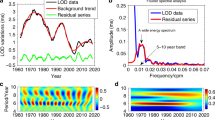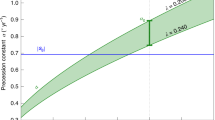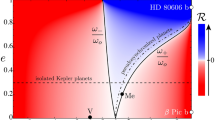Abstract
IN a recent article1, we gave some details of changes in the orbital inclination of Sputnik 2 (1957β) and suggested that these changes might be caused by the rotation of the atmosphere. Bosanquet has presented an analysis2 which supports this view, giving fair agreement with the observed changes. We have now completed a more thorough investigation, taking into account the spread of atmospheric resistance around perigee.
This is a preview of subscription content, access via your institution
Access options
Subscribe to this journal
Receive 51 print issues and online access
$199.00 per year
only $3.90 per issue
Buy this article
- Purchase on Springer Link
- Instant access to full article PDF
Prices may be subject to local taxes which are calculated during checkout
Similar content being viewed by others
References
Merson, R. H., and King-Hele, D. G., Nature, 182, 640 (1958).
Bosanquet, C. H., Nature, 182, 1533 (1958).
Author information
Authors and Affiliations
Rights and permissions
About this article
Cite this article
MERSON, R., KING-HELE, D. & PLIMMER, R. Changes in the Inclination of Satellite Orbits to the Equator. Nature 183, 239–240 (1959). https://doi.org/10.1038/183239b0
Issue Date:
DOI: https://doi.org/10.1038/183239b0
This article is cited by
-
Using the attitude response of aerostable spacecraft to measure thermospheric wind
CEAS Space Journal (2018)
-
Results of a joint ASI-NASA Study on the LAGEOS gravitomagnetic experiment and the nodal perturbations due to radiation pressure and particle drag effects
Il Nuovo Cimento B (1993)
-
Effect of particle drag on the LAGEOS node and measurement of the gravitomagnetic field
Il Nuovo Cimento B Series 11 (1990)
-
Royal Society meeting: Sputniks I and II—25 years ago
Nature (1983)
-
Rotational Speed of the Upper Atmosphere, at Heights of 200–300 km
Nature (1964)
Comments
By submitting a comment you agree to abide by our Terms and Community Guidelines. If you find something abusive or that does not comply with our terms or guidelines please flag it as inappropriate.



